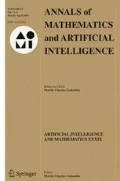Abstract
We illustrate the utility of the situation calculus for representing complex scheduling tasks by axiomatizing a deadline driven scheduler in the language. The actions arising in such a scheduler are examples of natural actions, as investigated in the concurrent situation calculus by Pinto (PhD thesis, 1994), and later by Reiter (Proc. Common Sense 96, 1996). Because the deadline driven scheduler is sequential, we must first suitably modify Reiter's approach to natural actions so it applies to the sequential case. Having done this, we then show how the situation calculus axiomatization of this scheduler yields a very simple simulator in GOLOG, a situation calculus-based logic programming language for dynamic domains.
Similar content being viewed by others
References
A.R. Haas, The case for domain-specific frame axioms, in: The Frame Problem in Artificial Intelligence. Proceedings of the 1987 Workshop, ed. F.M. Brown (Morgan Kaufmann, Los Altos, CA, 1987) pp. 343–348.
Y. Lespérance, H. Levesque, F. Lin, D. Marcu, R. Reiter and R. Scherl, A logical approach to high-level robot programming — a progress report, in: Control of the Physical World by Intelligent Systems, Working Notes of the 1994 AAAI Fall Symposium, New Orleans, LA (1994).
H.J. Levesque, R. Reiter, Y. Lespérance, F. Lin and R. Scherl, GOLOG: A logic programming language for dynamic domains, Journal of Logic Programming, Special issue on actions (1996), to appear.
F. Lin and R. Reiter, State constraints revisited, J. of Logic and Computation 4, Special issue on actions and processes (1994) 655–678.
C.L. Liu and J.W. Layland, Scheduling algorithms for multiprogramming in a hard real-time environment, Journal of the ACM 20(1) (1973) 46–61.
D. Marcu, Y. Lespérance, H. Levesque, F. Lin, R. Reiter and R. Scherl, Foundations of a logical approach to agent programming, in: Intelligent Agents Volume II — Proceedings of the 1995 Workshop on Agent Theories, Architectures, and Languages (ATAL-95), eds. M. Wooldridge, J.P. Muller and M. Tambe, pp. 331–346. Lecture Notes in Artificial Intelligence (Springer, 1996), to appear.
J. McCarthy, Situations, actions and causal laws, Technical report, Stanford University (1963). Reprinted in: Semantic Information Processing, ed. M. Minsky (MIT Press, Cambridge, MA, 1968) pp. 410–417.
J. McCarthy and P. Hayes, Some philosophical problems from the standpoint of artificial intelligence, in: Machine Intelligence, Vol. 4, eds. B. Meltzer and D. Michie (Edinburgh Univ. Press, Edinburgh, Scotland, 1969) pp. 463–502.
E.P.D. Pednault, ADL: Exploring the middle ground between STRIPS and the situation calculus, in: Proceedings of the First International Conference on Principles of Knowledge Representation and Reasoning (KR'89), eds. R.J. Brachman, H. Levesque and R. Reiter (Morgan Kaufmann, 1989) pp. 324–332.
J.A. Pinto, Temporal reasoning in the situation calculus, PhD thesis, University of Toronto, Department of Computer Science (1994).
R. Reiter, The frame problem in the situation calculus: a simple solution (sometimes) and a completeness result for goal regression, in: Artificial Intelligence and Mathematical Theory of Computation: Papers in Honor of John McCarthy, ed. V. Lifschitz (Academic Press, San Diego, CA, 1991) pp. 359–380.
R. Reiter, Proving properties of states in the situation calculus, Artificial Intelligence 64 (1993) 337–351.
R. Reiter, Natural actions, concurrency and continuous time in the situation calculus, in: Proc. Common Sense 96: 3rd Symposium on Logical Formalizations of Commonsense Reasoning (Stanford, CA, 1996).
L.K. Schubert, Monotonic solution of the frame problem in the situation calculus: an efficient method for worlds with fully specified actions, in: Knowledge Representation and Defeasible Reasoning, eds. H.E. Kyberg, R.P. Loui and G.N. Carlson (Kluwer, 1990) pp. 23–67.
Z. Yuhua and Z. Chaochen, A formal proof of the deadline driven scheduler, in: Formal Techniques in Real-Time and Fault Tolerant Systems, eds. H. Langmaak, W.-P. de Roever and J. Vytopil, Lecture Notes in Computer Science 863 (Springer, 1994) pp. 756–775.
Author information
Authors and Affiliations
Rights and permissions
About this article
Cite this article
Reiter, R., Yuhua, Z. Scheduling in the situation calculus: A case study. Annals of Mathematics and Artificial Intelligence 21, 397–421 (1997). https://doi.org/10.1023/A:1018981822532
Issue Date:
DOI: https://doi.org/10.1023/A:1018981822532




